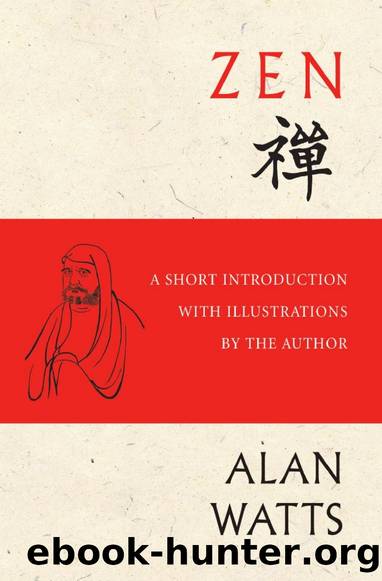Zen by Alan Watts

Author:Alan Watts [Watts, Alan]
Language: eng
Format: epub
ISBN: 9781843337140
Amazon: 1843337142
Goodreads: 316882
Published: 2019-06-10T16:46:04+00:00
direct pointing
The Zen way of teaching is to demonstrate Reality rather than to talk about it, or, if words are used at all, to avoid formally religious terminology and conceptual statements. When Zen speaks it expresses Reality, not with logical explanations and doctrines but with everyday conversation, or with statements that upset the normal conceptual mode of thinking so violently that they appear as utter nonsense. Because 43
ZEN
Zen desires to get rid of concepts, to shatter the rigid frames in which we try to possess life, it employs a thoroughgoing iconoclasm. At the same time, Zen as a formal religious cult reads the scriptures, uses images and ceremonies, and sometimes breaks down far enough to include sermons and explanations. But it is just the preservation of this formal aspect of religion which makes the informal and iconoclastic such a puzzling and effective contrast, a truth which Western reformers and iconoclasts have never appreciated.
The greater part of Zen literature consists of mondo, of brief dialogues between masters and pupils, which illustrate its peculiar method of instruction, pointing to the real now without interposing ideas and notions about it. Here, for example, is the way in which Zen deals with the problem of non-duality, concerning which Indian Buddhism has composed so many volumes of intricate explanation.
A monk asked Dosan, âHow do we escape the heat when summer comes and the cold when winter is here?â
44
Direct Pointing
The master said, âWhy not go where there is no summer, no winter?â
âWhere is such a place?â
âWhen the cold season comes, one is thoroughly chilled; when the hot summer is here, one swelters.â
As to escaping from Samsara, the world of opposites and everyday consciousness, to Nirvana, the realm of absolute unity and peace, Zen has this to say: Bokuju was once asked, âWe have to dress and eat every day, and how can we escape from all that?â
The master replied, âWe dress; we eat.â
âI do not understand.â
âIf you do not understand, put on your dress and eat your food.â
Or again:
âPray show me the way to deliverance.â
âWho has ever put you in bondage?â
45
ZEN
âNobody.â
âIf so, why should you ask for deliverance?â
Another master deals with this question rather more explicitly, but we must be careful that he does not fool us:
Hui-hai was asked, âHow can one attain the Great Nirvana?â
âHave no karma that works for trans-
migration.â*
âWhat is the karma for transmigration?â
âTo seek after the Great Nirvana, to abandon the defiled and take to the undefiled, to assert that there is something attainable and something realizable, not to be free from the
*
Karma (literally, action) is the law of causality, and thus the phrase
âkarma that works for transmigrationâ means the kind of action which has the effect of binding the agent to Samsara, where, according to general Buddhist belief, man is born again and again into the world until he realizes Nirvana.
46
Direct Pointing
teaching of opposites â this is the karma that works for transmigration.â
âHow can one be emancipated?â
âNo bondage from the very first, and
what is the use of seeking emancipation? Act as you will, go on as you feel â without second thought.
Download
This site does not store any files on its server. We only index and link to content provided by other sites. Please contact the content providers to delete copyright contents if any and email us, we'll remove relevant links or contents immediately.
| Philosophy | Spirituality |
The Way of Zen by Alan W. Watts(6614)
Ego Is the Enemy by Ryan Holiday(5448)
The Art of Happiness by The Dalai Lama(4130)
The Book of Joy by Dalai Lama(3986)
Why Buddhism is True by Robert Wright(3453)
Spark Joy by Marie Kondo(3302)
Shift into Freedom by Loch Kelly(3199)
Happiness by Matthieu Ricard(3048)
A Monk's Guide to a Clean House and Mind by Shoukei Matsumoto(2915)
The Lost Art of Good Conversation by Sakyong Mipham(2654)
The Meaning of the Library by unknow(2571)
The Unfettered Mind: Writings from a Zen Master to a Master Swordsman by Takuan Soho(2311)
The Third Eye by T. Lobsang Rampa(2267)
Anthology by T J(2213)
Red Shambhala by Andrei Znamenski(2199)
The Diamond Cutter by Geshe Michael Roach(2061)
Thoughts Without A Thinker: Psychotherapy from a Buddhist Perspective by Epstein Mark(2025)
Twilight of Idols and Anti-Christ by Friedrich Nietzsche(1894)
Advice Not Given by Mark Epstein(1880)
